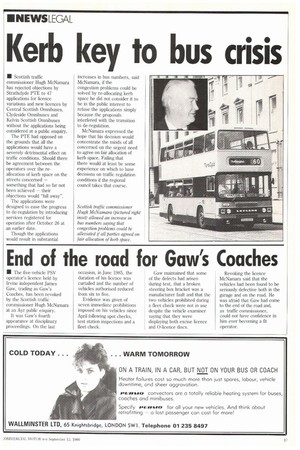Kerb key to bus crisis
Page 19

If you've noticed an error in this article please click here to report it so we can fix it.
• Scottish traffic commissioner Hugh McNamara has rejected objections by Strathclyde PTE to 47 applications for licence variations and new licences by Central Scottish Omnibuses, Clydeside Omnibuses and Kelvin Scottish Omnibuses without the applications being considered at a public enquiry.
The PTE had opposed on the grounds that all the applications would have a severely detrimental effect on traffic conditions. Should there be agreement between the operators over the reallocation of kerb space on the streets concerned — something that had so far not been achieved — their objections would "fall away".
The applications were designed to ease the progress to de-regulation by introducing services registered for operation after October 26 at an earlier date.
Though the applications would result in substantial increases in bus numbers, said McNamara, if the congestion problems could be solved by re-allocating kerb space he did not consider it to be in the public interest to refuse the applications simply because the proposals interfered with the transition to de-regulation.
McNamara expressed the hope that his decision would concentrate the minds of all concerned on the urgent need to agree on fair allocation of kerb space. Failing that there would at least be some experience on which to base decisions on traffic regulation conditions if the regional council takes that course.
Scottish traffic commissioner Hugh McNamara (pictured right inset) allowed an increase in bus numbers saying that congestion problems could be alleviated if all parties agreed on fair allocation of kerb space.




























































































